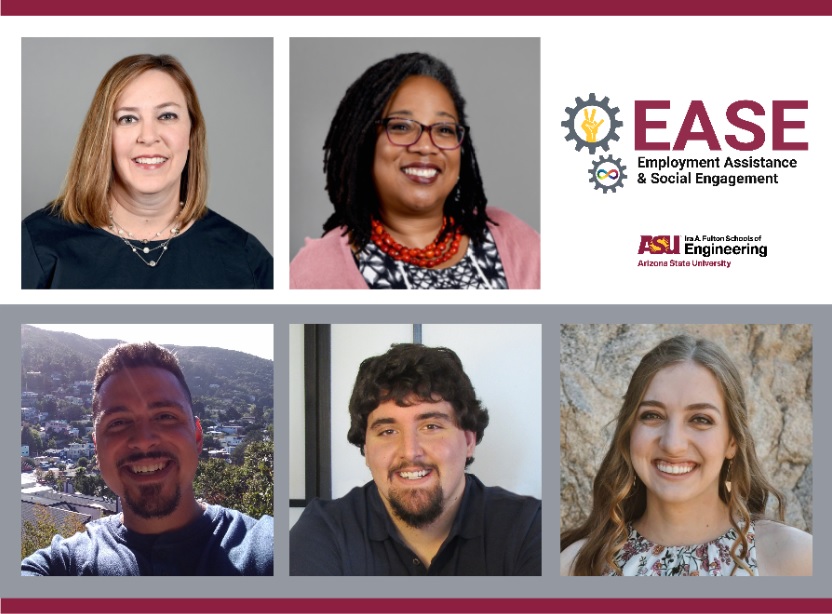According to recent data from the Centers for Disease Control, more than 5 million adults in the U.S. live with the developmental disability known as autism spectrum disorder. And although 44% of them have IQ scores in the average to above average range, 31% also have some sort of intellectual disability and many have difficulty with communication and social interactions.
If you’re an engineering major, a proclivity toward braininess and systemizing is big plus. But the part about contending with learning disabilities and social skills can make college in general — a time in life when good grades and the ability to network are essential to one’s success — especially difficult.
So when Arizona State University engineering Lecturer Deana Delp noticed students with autism in her courses were struggling despite their academic abilities, she wondered what she could do to help. Then she came across an ASU News article about Advocating Sun Devils (formerly Autistics on Campus), a student group that aims to create an inclusive environment and build a supportive community for people with autism at ASU. Immediately, she reached out to the group’s faculty adviser, College of Health Solutions Clinical Professor Maria Dixon, to brainstorm.
“Though these students possessed the academic skills, they struggled in other areas that affected their ability to be successful,” Dixon said. “These students needed support with social interactions, with interactions in the classroom setting or classroom rules, with advocating for themselves with faculty with limited understanding, seeking proper accommodations and finally finding access to adequate assistance during the job search process.”
After putting their heads together, she and Delp founded the Employment Assistance and Social Engagement (EASE) peer mentoring program, a joint project between the Fulton Schools of Engineering and the College of Health Solutions geared toward assisting students with autism with the transition to college life as well as career readiness skills.
“We wanted to help with their transition from high school to college, but there’s also the issue that so many adults on the spectrum either aren't employed or are underemployed,” Delp said. According to the CDC, individuals with autism experience high rates of unemployment or under-employment. “The end goal is for students to not only graduate but find a fulfilling job.”
Right now, the program is still in the pilot stage, focusing on implementing the peer mentoring aspect and developing a curriculum specific to the needs of students with autism in engineering. Ignazio Macaluso, a chemical engineering undergraduate who is on the spectrum himself, serves as the program’s curriculum developer.
“We went through the engineering requirements for each year within the general major scheme to make a guide, and then we also looked at things like getting accustomed to large class sizes, getting accustomed to networking, getting into clubs, getting into research and then pursuing internships, which will hopefully culminate in full-time employment after graduation,” he said.

Clockwise from top left: ASU engineering Lecturer Deana Delp, College of Health Solutions Clinical Professor Maria Dixon, communication disorders graduate student Sarah Conger, chemical engineering undergraduate Ignazio Macaluso and engineering undergraduate Gil Ruiz.
Macaluso has personally experienced some of the difficulties associated with being on the spectrum and not getting the kind of help he needed to succeed academically.
“I never really pursued assistance after the initial assistance I got in elementary school due to frustrations with, I guess you could say, modus operandi,” he said. “They tended to diminutize us and almost treat us like children, and they disregarded our abilities. So I just wanted to be a part of EASE to lend myself to providing what I lacked, essentially.”
To better meet students with autism where they’re at, EASE has mentors whose expertise areas vary. Sarah Conger, a College of Health Solutions graduate student specializing in communication disorders, provides support for communication and behavioral growth. She has experience working with younger children at the University of Washington Autism Center and older adolescents at Tempe High School. She’s excited to get to be working with young adults now at ASU.
“I like the idea of working with a group of students that is so diverse and that has a lot to bring to society,” Conger said.
Engineering undergraduate Gil Ruiz, who has a son who is on the spectrum, provides support for academic-related questions and growth.
“I am trying to learn as much as I can from the students we’re helping, and maybe that can help me in the future with my son as well,” he said.
Due to COVID-19, the EASE program is currently offering their services via Zoom, but the team is eager to get back to in-person sessions when possible.
“If you want to become successful in your career, you have to socialize with individuals,” Ruiz said. “So we start them off here, in a safe, controlled environment where we can ease them into it. And that way they can build confidence, and by the time they graduate, it'll be like second nature to them.”
The plans for phase two of the program are to work with ASU Career and Professional Development Services on skills like interviewing, resume-building and how to speak to a manager. There are also plans to reach out to businesses in the Phoenix area that are open to neurodiversity to partner on internship opportunities.
Beyond that, Delp and Dixon see the potential to scale the EASE model beyond engineering to other STEM majors.
“There have been a lot of studies about people with autism being geared more toward the STEM fields, and we have a fairly large population of students with autism at ASU, so there’s definitely room to expand,” Delp said.
Students with autism who are registered with Student Accessibility and Inclusive Learning Services are eligible to participate in the EASE program.
Top photo courtesy of iStock/Getty Images.
More Science and technology

ASU professor breeds new tomato variety, the 'Desert Dew'
In an era defined by climate volatility and resource scarcity, researchers are developing crops that can survive — and thrive — under pressure.One such innovation is the newly released tomato variety…

Science meets play: ASU researcher makes developmental science hands-on for families
On a Friday morning at the Edna Vihel Arts Center in Tempe, toddlers dip paint brushes into bright colors, decorating paper fish. Nearby, children chase bubbles and move to music, while…

ASU water polo player defends the goal — and our data
Marie Rudasics is the last line of defense.Six players advance across the pool with a single objective in mind: making sure that yellow hydrogrip ball finds its way into the net. Rudasics, goalkeeper…


